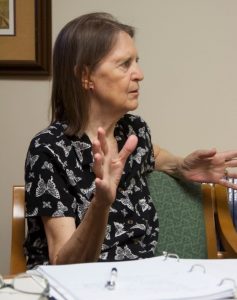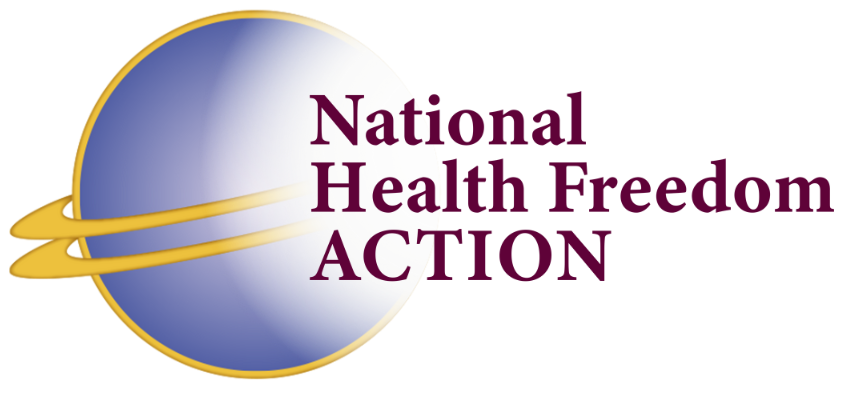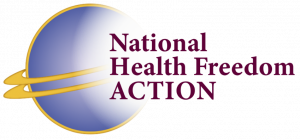
The following story is Leo Cashman’s recollection of the 6 years leading up to the passage of the first Safe Harbor Practitioner Exemption Bill MN-146A in 2001. Since that time NHFC and NHFA have worked to educate and coach advocates in states across the nation to pass similar bills that protect by law complementary and alternative practitioners right to practice. 11 states now have some form of Safe Harbor Practitioner Exemption Law: Minnesota, Rhode Island, California, Louisiana, Idaho, Oklahoma, Arizona (for homeopaths), New Mexico, Colorado, Nevada and Maine.
If you would like to work toward passage of a similar law in your state, NHFA is here to help. Contact us at info.nhfa@nationalhealthfreedom.org
Massachusetts currently has a Safe Harbor Practitioner Exemption bill awaiting a hearing in the legislature.
A Health Freedom Crisis in the 1990s Spurred Minnesota’s Legal Reform for
Holistic Health Practitioners
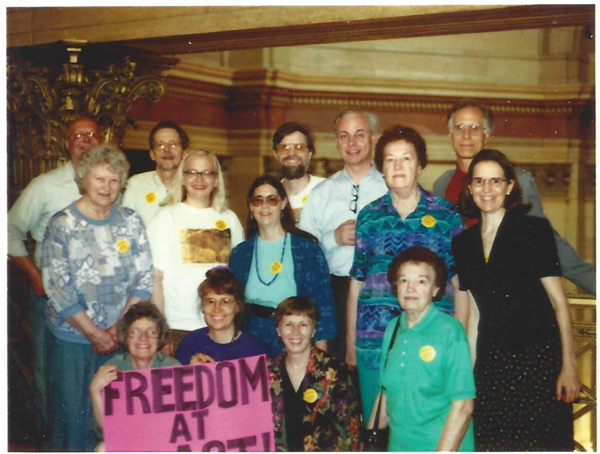
Diane Miller, Jerri Johnson, Leo Cashman and friends who were instrumental in the passage of the Safe Harbor Practitioner Exemption bill in Minnesota
Minnesota health freedom movement was jump started in the mid-1990s and all of the pieces of the movement that were woven together had to do with the oppressive behavior of the state’s dental and medical boards against their own licensed professionals and also governmental prosecutions of unlicensed healers. Those boards and prosecutors, with their attacks on leading health care practitioners, caused a grass roots pushback and gave rise to a strong health freedom movement in Minnesota.
One part of that movement was embodied by Dental Mercury Awareness (DMA), a group of dental patients most of whom had been patients of Dr. Gary Jacobson, DDS. He was an outspoken critic of dental amalgam mercury fillings and was a heroic leader for his patients and the Dental Mercury awareness group. DMA met once a month and patients shared not only the science but also how some of them had recovered illnesses such as colitis, allergies, multiple chemical sensitivity and even multiple sclerosis, with the help of having had their amalgam fillings removed and then detoxifying.
Another part of the movement centered around Dr. Keith Sehnert, MD, an ally of Gary Jacobson. Sehnert, an author, spoke out on the harm to health being done by dental mercury and on the related problem of fungal overgrowths (Candida albicans) that could be triggered by mercury exposure. patients formed their own support group and they met and shared patient information and stories.
A third part of the movement encompassed the state’s many unlicensed practitioners, such as Helen Healy, ND, and some other naturopathic medical doctors, and even a farmer helping people with the colostrum from his dairy cows.
In 1995 the state dental board investigated and brought charges against the outspoken dentist, Dr. Gary Jacobson, despite a lack of patient complaints. The board’s investigator embarked on what critics described as a “fishing expedition,” sometimes calling patients asking for them to file complaints and sifting aggressively through patient records looking for violations of the “standard of care,” which meant a departure from the way dentistry is normally practiced. Most dentists don’t remove mechanically sound mercury amalgam fillings but that is what Jacobson was doing, hence he was outside the standard of care and that was used to claim that he was a bad dentist. So, despite any allegations of harm, Jacobson was being charged with a long list of instances in which he was outside of generally accepted dental practice and the “standard of care.”
Dr. Keith Sehnert, MD, was similarly being investigated and prosecuted by the state’s medical board. There were no patient complaints – his patients praised him – and there were no allegations of harm, a “practice audit” revealed that Sehnert’s patients had more cases of hypothyroidism, fungal overgrowths, and mercury toxicity, than other doctors had, and this was taken as proof that Sehnert was a bad doctor. Being different was somehow being twisted into being wrong and outside of acceptable professional standards.
In 1996, Helen Healy, a naturopathic medical doctor, was charged by the state medical board attack for practicing medicine without a license. This prosecution seemed to come from nowhere as there were no patient complaints and no allegations of harm. But the board’s action was probably symbolic, as she was the state’s most prominent naturopathic medical doctor. By doing what she did – trying to help her patients become healthier – she was trespassing on the state’s medical monopoly. MN Statute 147.081 states that anyone who offers to “prevent, diagnose, correct or treat in any manner … any disease, illness or pain …” is practicing medicine and may be prosecuted by the medical board for doing such. The logical implication of the board’s action against Helen Healy was that any unlicensed healer, such as any homeopath, herbalist, massage therapist, health coach or nutritional counselor, could, if not licensed, be charged with practicing medicine without a license. Naturopathy was not licensed in Minnesota at that time and the medical board bluntly stated, in its prosecution of Healy, that she could not practice here without the naturopaths being licensed. The attack on Healy mobilized a large number of friends and backers of natural health care users and practitioners, joining forces with her because she had been senselessly attacked. Consumers, backed into a corner, and facing a loss of freedom and a likely loss in health, formed the largest part of the new health freedom movement.
We met with the state’s elected attorney general, a well-known politician
The dental board, the medical board and every other board and state agency has an assistant attorney general assigned to it and that assistant AG’s job is to advise the agency as to what the law says and to represent it, as in the actions being brought against the doctors, Jacobson, Sehnert and Healy. It was suggested that we meet with their boss, the state’s elected attorney general (AG), and talk to him about the attacks on health freedom that were being carried out under his oversight by the assistant attorney generals. So, we set up an in-person meeting with the state’s AG who was Skip Humphrey, son of the former US senator, former vice president Hubert H Humphrey. A small group of DMA leaders met with him, and we were able to show him the science about dental mercury and the patient stories of how Gary Jacobson has saved some of the patient’s health.
But Humphrey did not agree with us and was all in with allowing the health boards to do whatever they wanted. He had no sympathy for the patients who were about to lose their dentist. He had no concerns as the pile of charges being brought against Jacobson threatened to put him out of business. Despite his political background, he was not moved by any appeal to health freedom as a basic civil right.
We would remember that and, a few years hence, when Humphrey ran for governor of Minnesota, we could not cast our ballots for him, and the word went out informally into the natural health community that Humphrey had been hostile to natural health and health freedom. In a tight three-way race for governor, in November of 1998, Humphrey would come in third – a dramatic defeat for him.
We organized meetings and listened to an attorney who would help
It was in early 1996, with the attack on Helen Healy being the last straw, that we had a few large meetings, desperate for answers. confusion and some panic, and I pointed out to the group that there was an attorney sitting quietly in the back, listening. I said, “that woman in the back is an attorney. Let’s see what she thinks.” It was Diane Miller. She told us about the laws governing health freedom, and she told of the overly broad definition of the practice of medicine as stated in our state law. She had learned about this over the course of recent years from helping defend Herb Saunders, a dairy farmer in southern Minnesota, for helping his customers use colostrum from his new birthing cows in a strategic way so as to help the consumer’s immune system and perhaps overcome Lyme disease and other issues. County prosecutors went after this farmer as though he were a danger to the public and brought criminal charges against him; but attorney Calvin Johnson JD of Mankato, MN, took on the farmer’s case and Diane Miller helped as Co-counsel. After two successive trials, two juries failed to find the farmer guilty, and the county and the state eventually dropped all of the charges.
Core group discussion came up with the idea of a safe harbor law
In small group meetings, going over the legal dilemmas, Diane hatched the idea of Safe Harbor reform. It would involve going to the state legislature and modifying the law, carving out an exemption to protect most or all of the state’s unlicensed practitioners. Diane explained that dentists, nurses, chiropractors and other licensed health care professionals don’t have to worry about being charged with the practice of medicine without a license because the statutes that created licensure for each of these professions provide an exemption, shielding them for them from being charged with the practice of medicine. A new statute, one written specially for the unlicensed health care practitioners, could give them a place to exist legally, with an exemption from being charged with the practice of medicine. It would give them a “safe harbor” within which to practice, safe from harassment by the state medical board.
Licensed practitioners would be protected by an Expanded Practice reform
Of course, we asked Diane how we could protect holistic doctors from being prosecuted for being outside of the “standard of care.” Diane crafted language that would allow such a doctor to be able to use an alternative treatment or practice as long as that alternative treatment or practice is not more dangerous than the conventional, standard one. This concept has become known as “Expanded Practice.”
It would be too late to salvage the careers of Gary Jacobson and Keith Sehnert. Under the pressure of the Boards’ actions, these holistic doctors no longer kept their licenses, and their careers were ended. It was a loss for them personally and to their families, but it was also a blow to holistic dentistry and holistic medicine. Under mounting public pressure, the medical board settled with Helen Healy out of court, but she had to accept an agreement under which she agreed to practice under the supervision of two licensed medical doctors.
We were pleased that Skip Humphrey lost his bid for governor in November 1998
Skip Humphrey had been hostile to health freedom in our state. It surely cost him hundreds of thousands of votes in the gubernatorial election and we believe that is what helped hand the victory to a third-party candidate, a celebrity wrestler, Jesse (“the body”) Ventura.
Legislative saga kicked off in the 1999 legislative session
Republicans captured a majority in the Minnesota house and accordingly we went into the 1999 legislative session with a conservative Republican, a health committee member, Rep Lynda Boudreau as our chief author in the House. On February 8th, she introduced our bill in the house, HF 537.
In the first house health committee hearing, Rep. Lee Greenfield moved to entirely delete the expanded practice part of our bill. With only three minutes of discussion, Greenfield’s motion passed, and we lost the expanded practice reform part of our bill. That was stunning! We soldiered on, left only with the safe harbor part of our bill, the part for protecting unlicensed practitioners. Its journey was uncertain and we lobbied that health committee heavily. Finally, in March 1999, we passed the bill out of the health committee by a one vote margin. Only one vote. Every vote we got was a vote that was vitally needed.
On to the Civil Law Committee
The bill was referred to the Civil Law committee, which was mostly made up of attorneys. There were many hearings, many questions and many testimonies that we heard from. Diane Miller was always up front for the testimony, and I don’t know how we would have survived it without Diane. But the progress was slow and the committee chair, who was our ally, didn’t bring the bill up for a vote because, I think, he knew we didn’t have the votes to pass it. There was much criticism from attorney Rep Phil Carruthers, the ranking democrat. As the 1999 session ended in May the bill still held over – “tabled” – in the Civil Law committee. We would have the rest of 1999 to mobilize for greater grass-roots efforts and lobbying as we looked ahead to the showdown in the 2000 session. Jerri Johnson and Diane shared most of the lobbying duties at the Capital. Nancy Hone, a naturopath, scheduled their appointments and was also a grassroots organizer. I headed up a “field operation” phone tree that would get phone calls, letters and e-mails from our activists in legislative district as needed.
Some deaths came in the summer of 1999
In June, the dairy farmer, Herb Saunders, that Diane had helped rescued with two hung juries, had health issues and died. Shortly after that, we got word that Keith Sehnert, MD, had health issues and died. In July we learned that our senate chief author, Senator Janet Johnson, had fallen ill; she had been a perfect chief author, a senior democrat. Sadly, she died on August 21. We deeply mourned the loss. Her personal friend, Twyla Ring was given the democratic endorsement to run in a special election in November. Twyla Ring ran for public office for the first time in the special election to fill the vacant seat. Twyla won. When the 2000 session opened up, Twyla Ring agreed to be our chief author and carry on Senator Johnson’s work.
Major developments in the civil law committee
The year 2000 session opened with lengthy testimony in the House Civil Law on February 7th. At a second hearing on February 14th, Rep Phil Carruthers, a major critic of the bill, proposed a delete-all amendment that had many pages of new requirements on the unlicensed practitioners – prohibited acts, self-reporting of non-compliance, and an office set up the department of health to take complaints. His delete-all amendment was put up for a vote and the vote was a tie, so it was barely defeated. The hearing continued and our bill was not called for a vote. Instead, the chairman called for the parties to work out their differences and a third and final hearing would be held on February 26th.
We had a serious discussion in our next core group meeting, looking over the new oversight and consumer protection language. Many of us expressed fear that the new rules would be used to harass the unlicensed healers. But finally, as we finished, we agreed that Diane should go through the Carruthers language and try to incorporate as many of the rules and ideas as possible while not losing the core freedom of practice features. And Diane did that work.
On the final hearing day, the room was packed with supporters on both sides. It was show-down day. Our author, Lynda Boudreau put forth our own delete-all amendment – surprise – that was packed with many of the provisions that our chief critic, Carruthers, had called for. It had all sorts of consumer protection measures. With all of those consumer protection features, it looked like a “get tough on unlicensed practitioners” bill. Rep Carruthers was pleased with it and voiced enthusiastic support for the bill as it now stood. Yet we also got what we needed from the bill; we got the safe harbor, their safe harbor. Diane, whose background in law included some work as a mediator, had crafted a bill that mediated the differences and that gave both sides what they wanted.
After that, the bill had a new momentum and it passed through remaining house committees without much difficulty and it started to get necessary hearings in the senate. Our author Sen. Twyla Ring presented the bill, as modified bill in house Civil Law, into the senate health committee, where key senators in both parties supported it. It easily passed the senate health committee.
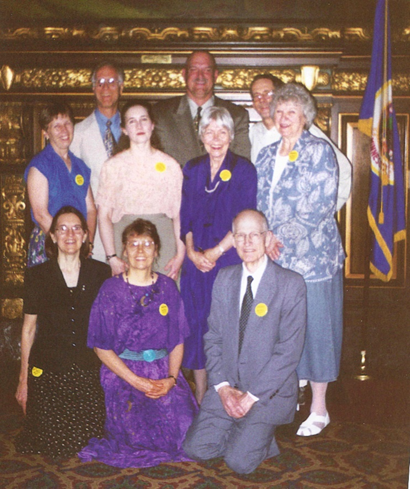
Diane Miller, Jerri Johnson, and Leo Cashman along with health freedom leaders in photo with Governor Jesse Ventura (center of back row), who signed the HF 3839 on May 11, 2000 (now MN statute 146A)
A new psychology helped give the bill an unstoppable momentum
With the Phil Carruthers oversight and consumer protection features added, many legislators who had been on the fence now joined the bandwagon in support of the bills. If you can’t make all these unlicensed practitioners go away, lets add some consumer protection, lets add some state oversight, let’s give the consumers a complaint process in case there are ethical breaches like false advertising or the crossing of sexual boundaries. There would be an office in the Department of Health that would investigate client complaints and bring forth disciplines if it saw fit.
Both in the senate as well as in the house, the senior legislators tucked our bill into their big omnibus bills, bills that would normally pass. When the omnibus bill was introduced onto the senate bill, there was an effort to strip our bill out of the omnibus bill, but the motion was easily defeated. Conference committees reconciled the language and gave both houses a final version, called HF 3839, which both houses approved. It was sent on to the governor for his signature. After some days of suspense and messages urging him to sign it, we learned on May 11 that he had signed it into law (now MN statute 146A). We did it!
I did a cover story for Twin Cities Wellness, a monthly news magazine. It hailed the house and senate’s performance and, especially, our chief authors Rep. Boudreau and Senator Ring. It praised Diane Miller and Jerri Johnson who were almost always together in the forefront of lobbying at the capitol. It spoke of Nancy Hone, a traditional naturopath, who worked at mobilizing the grass roots. It invited all of the health freedom community to a celebration that would come up on June 11th.
On June 11th, with balloons and all, we celebrated. The chief authors came and joined the health freedom leaders to receive flower bouquets for their persistent efforts at reform that finally won a victory. Attorney Rep. Phil Carruthers, our onetime critic who had become our great ally came, spoke warmly to us, and was applauded.
And so it was. Diane Miller gives a more detailed version of the Minnesota trek for freedom in her book Health Freedom, the Greatest Freedom of them all, Chapter 2. It tells the story from her point of view as a pivotal attorney, out-front at every hearing and, with Jerri Johnson, doing most of the direct lobbying too. This story by me tells how I think back upon it, a remarkable experience that I was a part of. But I should say that a freedom victory is not necessarily permanent, as efforts to undermine it can occur, and health freedom must be watched over and protected unto this day.
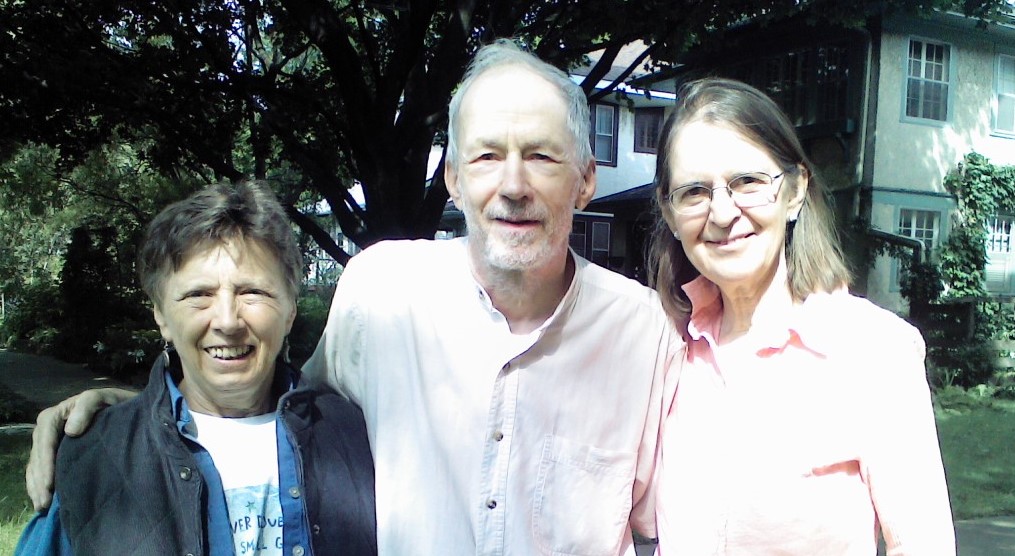
About 25 years ago Leo Cashman co-founded Minnesota Natural Health Coalition and MN Natural Health Legal Reform Project. After the win in 2000, he, along with Jerri Johnson and Diane Miller, co-founded National Health Freedom Coalition and National Health Freedom Action.
RECENT NEWS

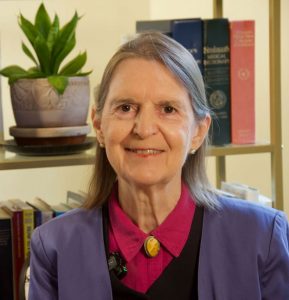
Associated Press Attacks Health Freedom Movement
October 30, 2025
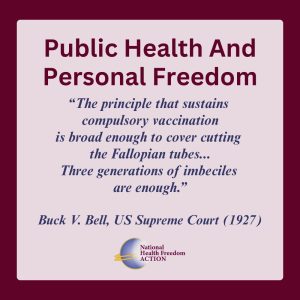
Public Health and Personal Freedom
October 22, 2025
